Home » Posts tagged 'Iraq' (Page 3)
Tag Archives: Iraq
American Oil Workers In Iraq Exiting Country At US Government Request
American Oil Workers In Iraq Exiting Country At US Government Request
Hours after the US drone attack which killed IRGC Quds Force General Qasem Suleimani, the US State Department issued an emergency alert urging all American citizens currently in Iraq to depart the country “immediately” due to “heightened tensions” in the region.
While urging Americans to take the earliest flights out of the country, it also informed citizens they must stay away from the US Embassy in Iraq, after earlier this week the Green Zone compound was stormed by pro-Iranian protesters and the outer walls set on fire. The US Embassy in Baghdad has already suspended all public consular activities.

#Iraq: Due to heightened tensions in Iraq and the region, we urge U.S. citizens to depart Iraq immediately. Due to Iranian-backed militia attacks at the U.S. Embassy compound, all consular operations are suspended. U.S. citizens should not approach the Embassy.
Some European countries have also begun issuing travel alerts for their citizens in Iraq, with the French government informing people to avoid any public or large gatherings, and to stay “prudent and discreet” while also avoiding taking photographs in public venues.
Additionally, foreign oil workers have begun departing Iraq, with Iraq’s Oil Ministry confirming early Friday that “a number of employees with US citizenship” working for oil companies in the south are readying to depart the country “in response to the request of their government.”
“The ministry asserts that the conditions are normal in oil fields throughout Iraq. Production and export were not affected,” the statement added, underscoring that the request for Americans to evacuate oil fields did not come from Baghdad authorities, but from Washington.
…click on the above link to read the rest of the article…
4,000 US Troop Surge To Middle East Could Be Imminent Amid Baghdad Chaos
4,000 US Troop Surge To Middle East Could Be Imminent Amid Baghdad Chaos
Three U.S. defense officials told Fox News on Tuesday that the U.S. Army’s 82nd Airborne Division’s alert brigade has been given orders to deploy to Kuwait amid the social unrest in Baghdad.
Even though all supporters of Iran-backed militias have withdrawn from the heavily fortified U.S. Embassy in Baghdad on Wednesday, the reinforcement of U.S. troops could be imminent.
Defense Secretary Mark Esper said in a statement on Tuesday that 750 troops are immediately deploying to the Middle East because of the attack on the U.S. embassy.

The US says it’s sending 750 troops to Iraq after its embassy in Baghdad was stormed by protesters.
Read more: https://aje.io/lw9m2
Esper said he had authorized the deployment of an infantry battalion from the Immediate Response Force (IRF) of the 82nd Airborne Division.
“This deployment is an appropriate and precautionary action taken in response to increased threat levels against U.S. personnel and facilities, such as we witnessed in Baghdad today,” Esper said in a statement.
Apart from the rapid deployment, the three sources told Fox that approximately 4,000 paratroopers could be deployed to the region in the coming days.
There are 5,000 US troops currently stationed in Iraq supporting local forces, among the more than 60,000 troops positioned in military bases across the Middle East.
President Trump blamed Iran for the attack on the U.S. embassy in Baghdad in a tweetstorm on Tuesday.
“Iran killed an American contractor, wounding many. We strongly responded, and always will,” tweeted Trump. “Now Iran is orchestrating an attack on the U.S. Embassy in Iraq. They will be held fully responsible.”
…click on the above link to read the rest of the article…
Iraq Protestors Storm US Embassy In Baghdad
Iraq Protestors Storm US Embassy In Baghdad
Thousands of Iraqi protestors attacked various parts of the US embassy in Baghdad on Tuesday after US airstrikes killed dozens of Iran-backed Iraqi militia over the weekend. The attack on the embassy has been widely documented on Twitter with videos and pictures showing the destruction.

Protestors are currently breaking into the #US Embassy in #Baghdad, #Iraq. Kata’ib #Hezbollah supporters have managed to break through the first security gate (photo via @thestevennabil) flags can be seen.
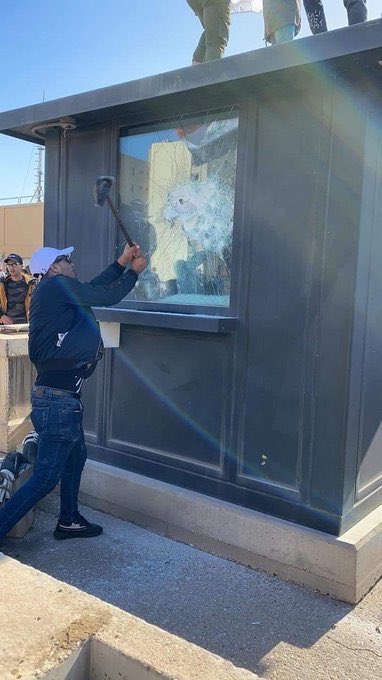
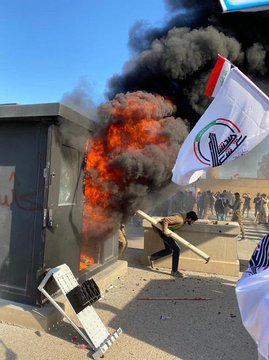
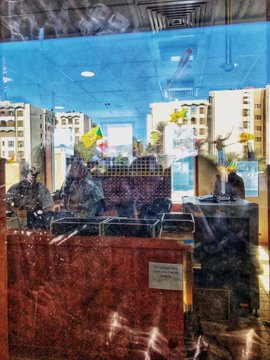
One freelance journalist recorded the moment when the angry mob chanted, “No, no to America, no, no to Israel” outside of the embassy in Baghdad’s Green Zone.

“No, no to America, no, no to Israel.” outside the #US #Embassy in Baghdad’s Green Zone. #Iraq
…click on the above link to read the rest of the article…
Iraqi Militias Vow “Strong Response” To US ‘Occupiers’ Imminent After Airstrikes
Iraqi Militias Vow “Strong Response” To US ‘Occupiers’ Imminent After Airstrikes
After US fighter jets bombed five facilities controlled by the Kataib Hezbollah militia group in Iraq and Syria on Sunday in response to the killing of a U.S. civilian contractor in a rocket attack on an Iraqi military base — which in turn killed at least 24 people and injured at least 50 — Iraqi militias are warning a “strong response” is coming.
And in another sign that nothing good can come of the bloody tit-for-tat which could escalate into major regional war, the US has managed to make many more enemies than allies with the Sunday airstrikes, starting with Iraqi President Barham Saleh, who slammedthe attack as “unacceptable and considered as an aggressive action and violation of Iraqi sovereignty.”
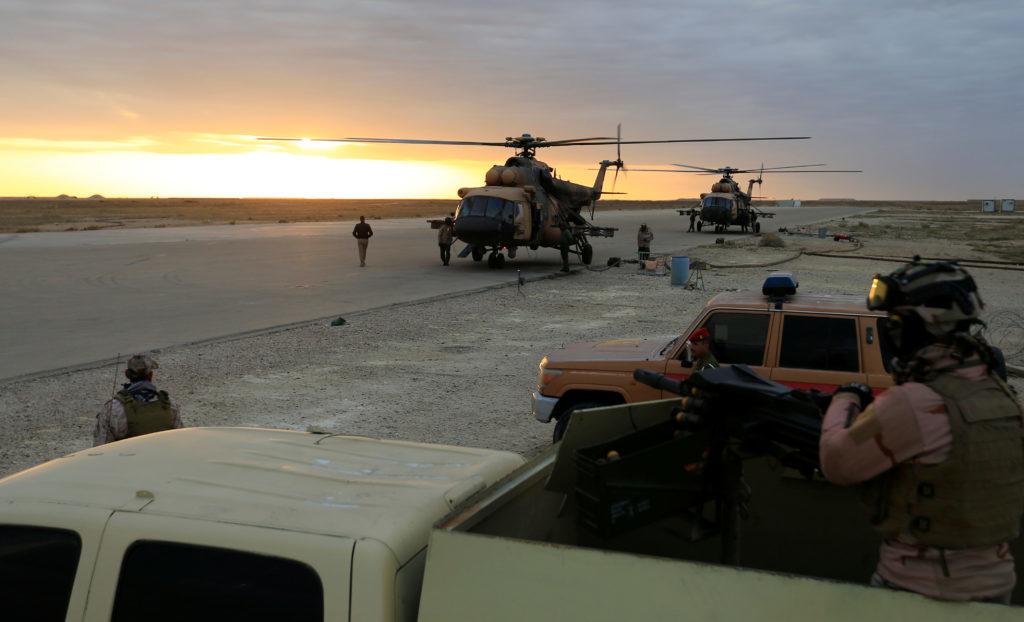
One of Iraq’s most powerful Popular Mobilization Forces (PMF) commanders, Jamal Jaafar Ibrahimi (also, Abu Mahdi al-Mohandes), put the some 5,000 American troops in Iraq on notice, saying they are preparing a response.
He threatened, according to Reuters:
“The blood of the martyrs will not be in vain and our response will be very tough on the American forces in Iraq.”
Over the weekend and into Monday US forces, mostly based in the country’s north where they’ve been training counter-ISIS Iraqi units, have reportedly tightened security and are on a high level of alert.
This after a Friday night rocket attack of unknown origin against a US base in Kirkuk which killed a US contractor. The subsequent US bombing raids were based on Washington’s immediate assumption and charge that Kataib Hezbollah or another “Iran-linked” Iraqi militia was behind it.
…click on the above link to read the rest of the article…
Imperial Capital but America-First Nation

Imperial Capital but America-First Nation
Is America still the world’s last superpower with global policing obligations? Or should we shuck off this imperial role and make America, again, in Jeane Kirkpatrick’s phrase, “a normal country in a normal time”?
“Let someone else fight over this long blood-stained sand,” said President Donald Trump in an impassioned defense of his decision to cut ties to the Syrian Kurds, withdraw and end these “endless wars.”
Are our troops in Syria, then, on their way home? Well, not exactly.
Those leaving northern Syria went into Iraq. Other U.S. soldiers will stay in Syria to guard oil wells that we and the Kurds captured in the war with ISIS. Another 150 U.S. troops will remain in al-Tanf to guard Syria’s border with Iraq, at the request of Jordan and Israel.
And 2,000 more U.S. troops are being sent to Saudi Arabia to help defend the kingdom from Iran, which raises a question: Are we coming or going?
In his conflicting statements and actions, Trump seemingly seeks to mollify both sides of our national quarrel:
Is America still the world’s last superpower with global policing obligations? Or should we shuck off this imperial role and make America, again, in Jeane Kirkpatrick’s phrase, “a normal country in a normal time”?
In Middle America, anti-interventionism has carried the day. As Trump says, no declaration at his rallies is more wildly welcomed than his pledge to end our Middle East wars and bring the troops home.
But in this imperial capital, the voice of the interventionist yet prevails. The media, the foreign policy elite, the think tanks, the ethnic lobbies, the Pentagon, the State Department, Capitol Hill, are almost all interventionist, opposed to Trump’s abandonment of the Kurds. Rand Paul may echo Middle America, but Lindsey Graham speaks for the Republican establishment.
…click on the above link to read the rest of the article…
Peak oil in Asia: where will the oil come from for the Asian Century?
Peak oil in Asia: where will the oil come from for the Asian Century?
Asian oil production peaked above 8 mb/d for the period between 2008 and 2016 (with spikes in 2010 and 2015). The 2015 peak was mainly caused by peak oil in China. Since then Asia’s decline was almost 800 kb/d or 9%.

The rest of Asia peaked already in 2000 (the year Australia peaked) followed by a very modest decline of 1.1% pa. Let’s go through the countries one by one.
In the following, net oil imports are defined as the difference between oil consumption and production. Please see the note at the end of this post.





Thailand’s consumption increases faster than production.

…click on the above link to read the rest of the article…
Lebanon’s President Announces Israeli Attacks Are “Declaration Of War”
Lebanon’s President Announces Israeli Attacks Are “Declaration Of War”
After pro-Iran allies in Lebanon, Syria and Iraq were all hit in suspected Israeli strikes in the space of less than 24 hours, signalling a new aggression out of Tel Aviv and willingness to risk yet another major Middle East war, Arab capitals are now alerting their armed forces to be on a war footing.
Lebanese President Michel Aoun on Monday condemned the “Israeli assault on the southern suburbs of Beirut” and told the country’s United Nations Special Coordinator, that the recent spate of drone strikes on Lebanon amount to a “declaration of war”.
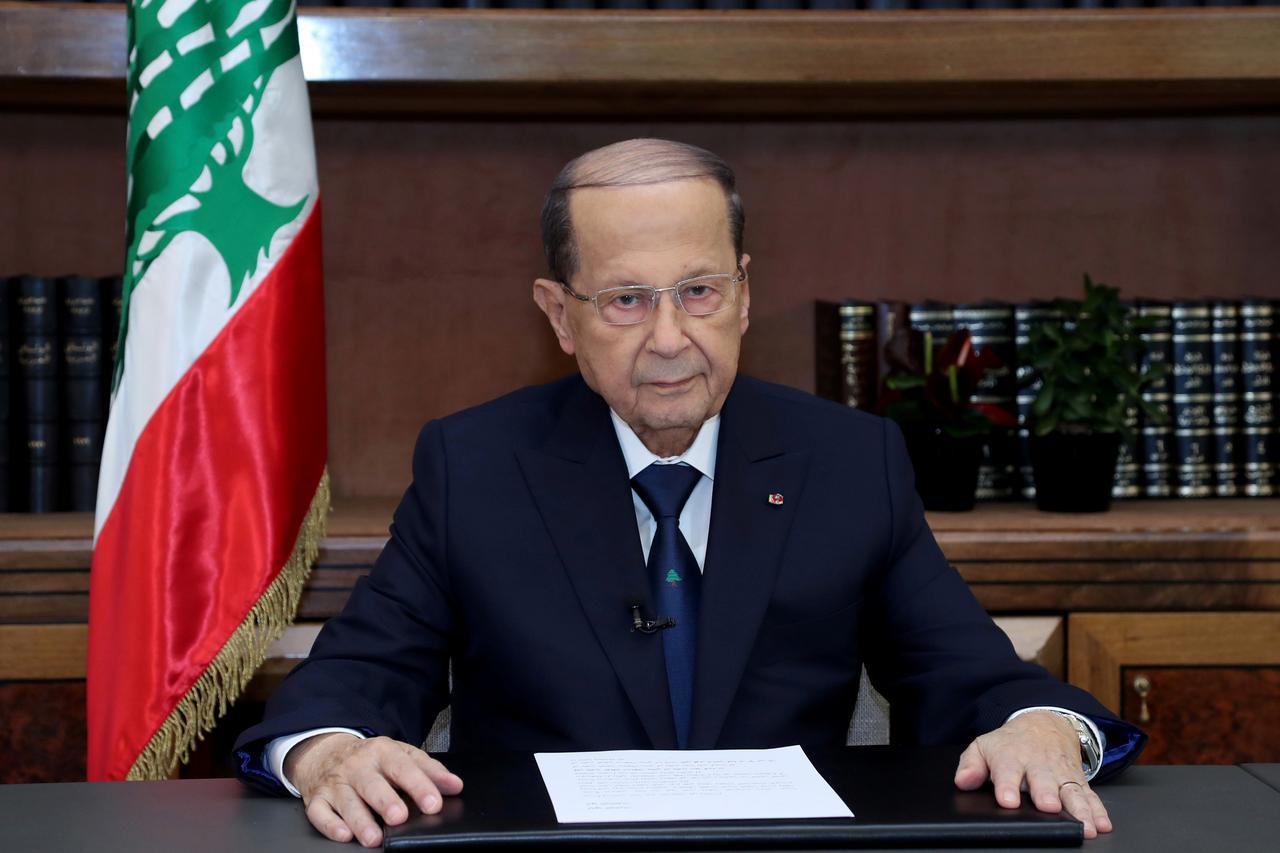
Especially in Lebanon, where the most powerful military force is not the Army but Shiite paramilitary group Hezbollah, tensions are soaring after Hezbollah media offices in Beirut were targeted by Israeli drones overnight Sunday.

New Video of alleged Israel strikes in east Lebanon ~ an hour ago, targeting Palestinian Group PFLP.
If true, this may be 4th military incident in Lebanon-Syria-Iraq involving Israel in 24 hours. Via @tobiaschneider
A separate Israeli operation the day following reached deep into Lebanon, killing a PFLP-GC leader in Lebanon’s Bekaa Valley (a Palestinian paramilitary group).
Hezbollah leader Hassan Nasrallah described the weekend aggression as was the first Israeli attacks inside Lebanon since the devastating month-long 2006 war; however, Israel has yet to claim the Beirut attack.
Global Warming and U.S. National Security Diplomacy
Global Warming and U.S. National Security Diplomacy

Old power station, West Linn, Oregon. Photo: Jeffrey St. Clair.
Control of oil has long been a key aim of U.S. foreign policy. The Paris climate agreements and any other Green programs to reduce the pace of global warming are viewed as threatening the aim of dominating world energy markets by keeping economies dependent on oil under U.S. control. Also blocking U.S. willingness to help stem global warming is the oil industry’s economic and hence political power. Its product is not only energy but also global warming, along with plastic pollution.
This fatal combination of the national security state’s mentality and oil industry lobbying threatens to destroy the planet’s climate. The prospect of raising temperatures and sea levels along the coasts while inland regions suffer drought is viewed simply as collateral damage to the geopolitics of oil. The State Department is reported to have driven out individuals warning about global warming’s negative impact.[1]
The only attempts to restrict oil imports are the new Cold War trade sanctions to isolate Russia, Iran and Venezuela. The aim is to increase foreign dependence on U.S., British and French oil, giving American strategists the power to make other countries “freeze in the dark” if they follow a path diverging from U.S. diplomatic aims.
It was the drive to control the world’s oil trade – and to keep it dollarized – that led the United States to overthrow the Iranian government in 1953, George W. Bush and Dick Cheney to invade Iraq in 2013, and most recently for Donald Trump to isolate Iran while backing Saudi Arabia and its Wahabi foreign legion in Syria, Iraq and Yemen. Sixty years earlier, in 1953, the CIA and Britain joined to overthrow Iran’s elected President Mohammad Mosaddegh to prevent him from nationalizing the Anglo-Iranian Oil Company. A similar strategy explains U.S. attempts at regime change in Venezuela and Russia.
…click on the above link to read the rest of the article…
Mystery Airstrikes On Iraqi Camp Were Israeli Stealth Jets In “Anti-Iran” Escalation
Mystery Airstrikes On Iraqi Camp Were Israeli Stealth Jets In “Anti-Iran” Escalation
Regional experts had immediately suspected the possibility of an Israeli air raid after a pro-Iranian militia arms depot in Iraq was obliterated during a mysterious attack on July 19, and another reported follow-up attack this past Sunday.
The attack happened around 80 km from the Iranian border and 40 km north-east of Baghdad at Camp Ashraf, former home to the Iranian exile group Mojahedin-e Khalq, but now reportedly in the hands of Iranian intelligence and paramilitaries.
Speculation was rampant in the days that followed as to the source of the ‘mysterious’ air strikes – or what was also initially reported as a drone strike – however, some pointed the finger at an American operation targeting Iranian militants inside Iraq.
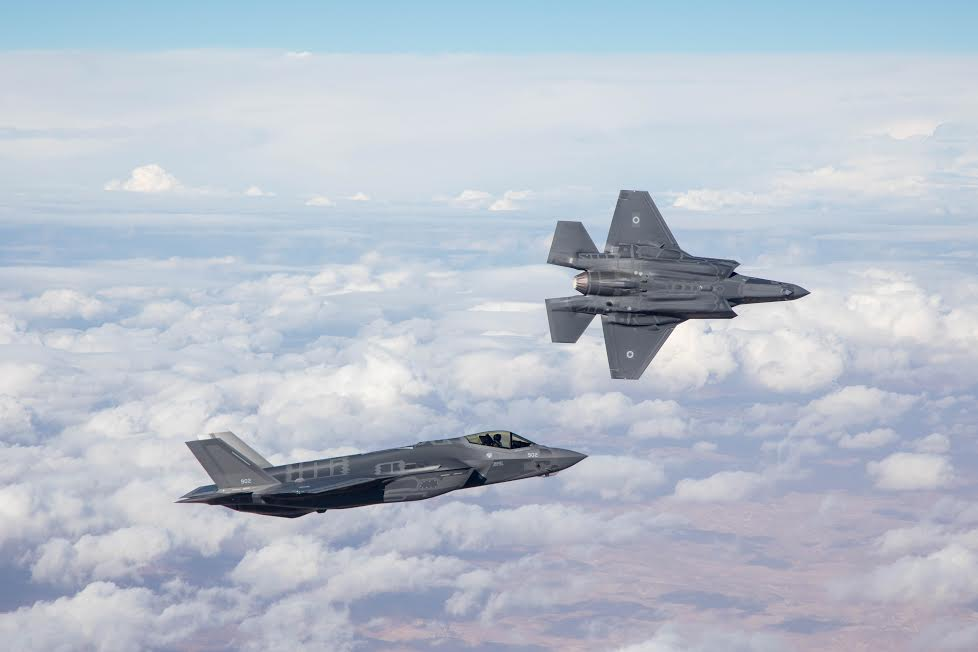
But now Israeli and regional media, citing western diplomats, have confirmed it was a nearly unprecedented Israeli operation on Iraqi soil — representing a major escalation and expansion of Israel’s anti-Iran operations.
Israel reportedly launched a total of two separate air strike operations on the camp using its US-supplied F-35 stealth fighter jets.
According to the Israeli newspaper Haaretz:
Israel has expanded the scope of its anti-Iranian attacks and struck targets in Iraq, the London-based Arabic newspaper Asharq Al-Awsat reported Tuesday.
According to the report, which cites anonymous Western diplomats, Israel struck Iranian warehouses storing arms and missiles at Camp Ashraf, north-east of Baghdad, twice in the past month.
On July 19, the base was struck by an Israeli F-35 fighter jet, the sources added. The base was allegedly attacked again on Sunday.
…click on the above link to read the rest of the article…
Tomgram: Michael Klare, It’s Always the Oil
Tomgram: Michael Klare, It’s Always the Oil
What more did you need to know once Secretary of State Mike Pompeo insisted that a suicide bombing in Kabul, Afghanistan, claimed by the Taliban, was Iranian-inspired or plotted, one “in a series of attacks instigated by the Islamic Republic of Iran and its surrogates against American and allied interests”? In other words, behind the Sunni extremist insurgents the U.S. has been fighting in Afghanistan since October 2001 lurks the regime of the Shiite fundamentalists in Tehran that many in Washington have been eager to fight since at least the spring of 2003 (when, coincidentally enough, the Bush administration was insisting that Saddam Hussein’s Iraqi regime had significant ties to al-Qaeda).
It couldn’t have made more sense once you thought about it. I don’t mean Pompeo’s claim itself, which was little short of idiotic, but what lurked behind it. I mean the knowledge that, only a week after the 9/11 attacks, Congress had passed an authorization for the use of military force, or AUMF, that allowed the president (and any future president, as it turned out) “to use all necessary and appropriate force against those nations, organizations, or persons he determines planned, authorized, committed, or aided the terrorist attacks that occurred on September 11, 2001, or harbored such organizations or persons.”
In other words, almost 18 years later, as Pompeo knows, if you can link any country or group you’re eager to go to war with to al-Qaeda, no matter how confected the connection, you can promptly claim authorization to do your damnedest to them. How convenient, then, should you be in the mood to make war on Iran, if that country just happens to be responsible for terror attacks linked to the Taliban (which once did harbor al-Qaeda and Osama bin Laden).
…click on the above link to read the rest of the article…
You had better memorize the term: de-dol-la-ri-za-tion
You had better memorize the term: de-dol-la-ri-za-tion
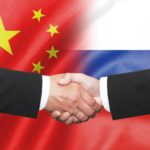
Some say it was Colonel Muammar Qaddafi, who wanted to dethrone the dollar, and so he paid for it with his own life. Others say it was Iraq’s President Saddam Hussein, who wanted to make settlements in a currency other than the US dollar, and he was hanged. Now it is Russia and China, which want to do the same. Just days ago an agreement was signed to this effect.
(i) Russia and China have decided to begin to make mutual settlements increasingly in their respective national currencies, and
(ii) they have decided to bypass the SWIFT system, introducing their own instead.1)
Moscow has also revealed lately that Russia has stopped using the US dollar and the SWIFT system for settlements in arms trade.2)
The exchange of goods between Russia and China is significant; Russian weaponry has a lot of clients around the globe. On the other hand both countries, and especially China, have large dollar reserves. And both states are under attack from the West, be it economic sanctions against Moscow, be it American trade war against Beijing.
To administer punishment for such a daring act was a child’s play in the case of Libya and Iraq: the two countries were swiftly dealt with. What can one do with a nuclear superpower on the other hand and Asia’s largest economic tiger on the other?
If Washington has wanted to weaponize Moscow against Beijing or the other way round as it seems it has, then the strategists on the Potomac must swallow a bitter pillow. The hybrid war waged against Russia in Georgia, Ukraine, Moscow, the Baltic States, Poland as well as in Venezuela and Syria rather than weakening the target state have cemented its embrace with the Middle Kingdom.
…click on the above link to read the rest of the article…
Persian Gulf oil export peak after tanker attacks?
Persian Gulf oil export peak after tanker attacks?
Tankers holed and burning in the Gulf of Oman are not a good sign for future oil exports from the Persian Gulf.


https://in.reuters.com/article/mideast-tankers-facts/latest-on-suspected-attacks-on-tankers-in-gulf-of-oman-idINKCN1TE1H3
Oil exports from the Persian Gulf have been peaking in the last 3 years 2016-2018 at around 22.3 mb/d. That was before the US sanctions on Iran were tightened in the 1st half of 2019.

Exports are defined here as the difference between oil production (crude oil, condensate and NGLs) and oil consumption with latest data taken from the BP Statistical Review published 11/6/2019.
https://www.bp.com/en/global/corporate/energy-economics/statistical-review-of-world-energy.html
Let’s go through this country by country with a focus on the period since 2005 when global (conventional) crude oil production started to peak.

The drop in Saudi exports after 2005 happened in 2 phases: first, production decline until mid 2007 – which contributed to the oil price shock in 2008 and then secondly lower demand during the 2009 financial crisis. The warnings in Matt Simmons’ book “The coming Saudi oil shock and the world economy” has materialized to some extent without this being recognised by governments, the private sector, the media and the public at large.
30/10/2018 Saudi Update October 2018 http://crudeoilpeak.info/saudi-update-october-2018
5/7/2018 Saudi Arabia was supposed to pump almost 14 mb/d in 2018
http://crudeoilpeak.info/saudi-arabia-was-supposed-to-pump-almost-14-mbd-in-2018

Sanctions imposed on Iraq after Desert Storm were replaced by an oil for food program started in 1995. It limited Iraq’s oil exports to around 2 mb/d. The objective of the 2003 Iraq war was remove this cap. It was only in 2011 that this export level was exceeded.

…click on the above link to read the rest of the article…
The Most Crucial Pipeline Of The Middle East?
The Most Crucial Pipeline Of The Middle East?

Contemporary Middle Eastern history is strongly influenced by energy politics. Besides providing revenue for the state’s coffers, oil is also a potent geopolitical tool in the hands of resource-rich countries. Recently, officials from Lebanon, Syria and Iraq have engaged in talks to restart the dysfunctional pipeline that once connected oilfields near Kirkuk in Iraq with the coastal city of Tripoli in Lebanon. Restarting the pipeline could have long-term political, economic, and strategic consequences for the involved states and the wider region.
The original infrastructure was constructed during the 30s of the previous century when two 12-inch pipes transported oil from Kirkuk to Haifa in British mandated Palestine and Tripoli in French-mandated Lebanon. The Tripoli line was supplemented by a 30-inch pipeline in the 50s which could transport approximately 400,000 barrels/day. The Kirkuk-Tripoli pipeline was suspended by Syria during the Iraq-Iran war in an attempt to support Tehran in its struggle against Baghdad.

(Click to enlarge)
Paving the way
The current political climate, which has enabled cooperation between Lebanon, Syria, and Iraq, is the consequence of one country’s foreign policy. Since the U.S. invasion of Iraq and the overthrow of Saddam Hussein, Iranian influence has grown considerably across the Middle East. Tehran’s support for proxies in neighboring countries has strongly influenced regional politics and made Saudi Arabia nervous of what it sees as “Persian encroachment”.
The Iranian support for Syria’s President Assad provided a lifeline to the regime during the country’s civil war. Tehran has invested significantly in maintaining the position of its ally in Damascus. In neighboring Iraq, the democratization process installed a Shia-dominated parliament which is supported by powerful paramilitary groups funded and organized by the Quds force, the branch of Iran’s Revolutionary Guard responsible for extraterritorial activities. Despite significant military and political gains, consolidation is required to cement the ties between Iran’s Arab partners, which would also benefit Tehran.
…click on the above link to read the rest of the article…
Turkey Invades Northern Iraq In Operation Against Kurdish Militants
Turkey Invades Northern Iraq In Operation Against Kurdish Militants
Turkey has launched a cross-border operation into neighboring Iraq against Kurdish militants in a mountainous northern region of the country.
The Turkish defense ministry confirmed its military unleashed a barrage of artillery fire and air strikes on Monday afternoon before ground forces entered northern Iraq to “demolish the caves and shelters that are being used by terrorist groups and to eliminate terrorists” — a reference to the outlawed PKK.
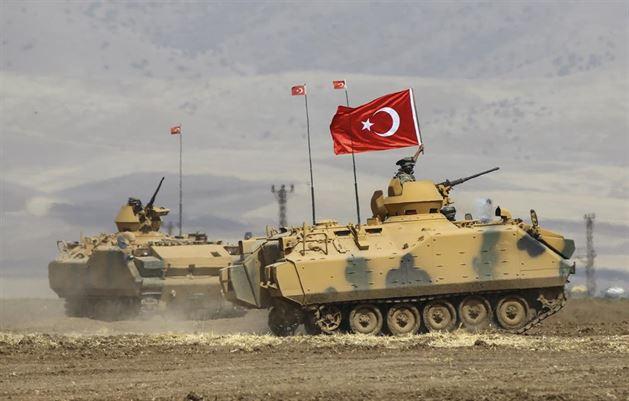
“The operation, with the support of our attack helicopters, is continuing as planned,” the statement said further. While cross-border shelling has happened somewhat frequently in the past, Turkey has rarely sent ground troops.
Back in December 2015 when Turkey, claiming to be engaged in counter-ISIS and general counter-insurgency operations, crossed into Iraq with a large ground force then Iraqi Prime Minister Haidar Abadi demanded Turkey cease violating Iraqi sovereignty, in a standoff which proved a major embarrassment for Baghdad.
Turkish state media released video footage of its operation inside Iraq:
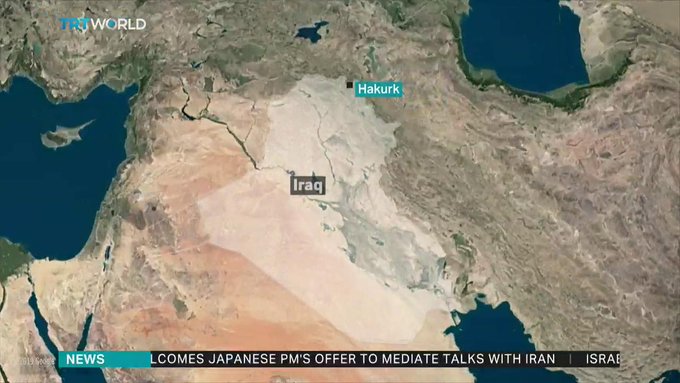

Turkey launches a counter-terrorism operation dubbed Pence, which means claw in Turkish, , in northern Iraq https://www.trtworld.com/article/27052
Not only has Turkey not been bashful about routinely violating the sovereignty of both Iraq and Syria ostensibly to “fight terrorists”, it has often positively boasted about it and published video footage of the incursions.
Citing the defense ministry, Reuters reports the following of the ongoing, controversial operation:
It said the operation targeted Iraq’s Hakurk region, just across the border from Turkey’s southeastern tip, which also borders Iran. The Kurdistan Workers Party (PKK) militant group is based in northern Iraq, notably in the Qandil region to the south of Hakurk.
Video published by the ministry showed helicopters landing commandos on mountainous terrain. It also shared photos showing shells fired by howitzers and soldiers perched on ridges, surveying hillsides with their rifles.
…click on the above link to read the rest of the article…
Exxon Evacuates All Foreign Staff From Iraqi Oilfield On Security Concerns
Exxon Evacuates All Foreign Staff From Iraqi Oilfield On Security Concerns
At the end of a week that’s witnessed a dangerous US military build-up in the Persian Gulf amid anti-Iran war rhetoric, Exxon Mobil has evacuated all of its foreign staff from Iraq’s West Qurna 1 oilfield, flying them to Dubai until “the situation is secure,” according to a company statement.
Total staff evacuated is about 60, cites Reuters, and comes days after the US ordered all non-emergency personnel to leave the US embassy in Baghdad in an extremely rare security move, claiming intelligence that shows Americans are under immediate threat from Shia milias backed by Iran. Oil field in southern Iraq, via Iraq’s Ministry of Oil
Iraq’s state-owned South Oil Company, which owns the oil field from which the Exxon Mobil employees have been evacuated, announced Saturday that production is continuing without disruption at 440,000 barrels per day (bpd) under the operation of Iraqi engineers.
“Exxon Mobil’s evacuation is a precautionary and temporary measure. We have no indication over any dangers, the situation is secure and very stable at the oilfield which is running at full capacity and producing 440,000 bpd,” a South Oil spokesman said.
And Exxon Mobile in a separate company press release said, “ExxonMobil has programs and measures in place to provide security to protect its people, operations and facilities. We are committed to ensuring the safety of our employees and contractors at all of our facilities around the world.”
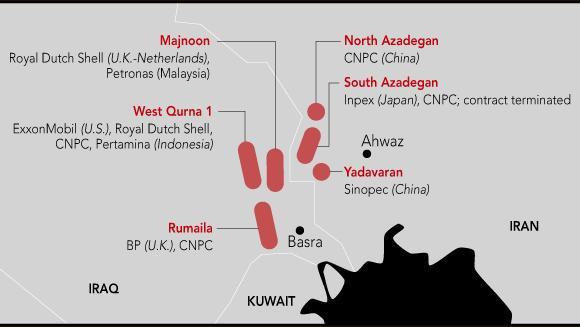
The evacuation was reportedly completed early on Saturday in phases which had started on Friday: “Last night 28 employees were evacuated to the airport and the rest were sent to the camp. This morning they were evacuated to the airport and no (foreign) staff remain in the field,” according to a security firm which oversaw their emergency departure.
…click on the above link to read the rest of the article…



